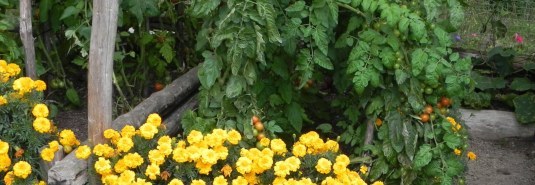
Permaculture is an approach to designing human settlements and agricultural systems that are modeled on the relationships found in natural ecologies. The word 'permaculture' was coined by Bill Mollison and David Holmgren as a contraction of permanent (sustainable) and agriculture.
Permaculture is sustainable land use design. This is based on ecological and biological principles, often using patterns that occur in nature to maximise effect while minimizing wasted energy. Permaculture aims to create stable, productive systems that provide for human needs, harmoniously integrating the land with its inhabitants. The ecological processes of plants, animals, their nutrient cycles, climatic factors and weather cycles are all part of the picture. Inhabitants’ needs are provided for using proven technologies for food, energy, shelter and infrastructure. Elements in a system are viewed in relationship to other elements, where the outputs of one element become the inputs of another. Within a Permaculture system, work is minimised, "wastes" become resources, productivity and yields increase, and environments are restored. Permaculture principles can be applied to any environment, at any scale from dense urban settlements to individual homes, from farms to entire regions.
Marlies Ortner (Permakulturakademie im Alpenraum / at)
Information
25.10.2011
- 14:30
Grüne Akademie
Links and more..
- ###view_event_appearance_link_homepage###
- ###view_event_appearance_link_homepage_2###
- ###view_event_appearance_link_homepage_3###
- ###view_event_appearance_link_homepage_4###
- ###view_event_appearance_link_wikipedia_en###
- ###view_event_appearance_link_wikipedia_en_2###
- ###view_event_appearance_link_wikipedia_en_3###
- ###view_event_appearance_link_imdb###
- ###view_event_appearance_link_imdb_2###
- ###view_event_appearance_link_blog###
- ###view_event_appearance_link_blog_2###
- ###view_event_appearance_link_blog_3###
- ###view_event_appearance_link_blog_4###
- ###view_event_appearance_link_interview###
- ###view_event_appearance_link_interview_2###
- ###view_event_appearance_link_interview_3###
- ###view_event_appearance_link_interview_4###
- ###view_event_appearance_link_article###
- ###view_event_appearance_link_article_2###
- ###view_event_appearance_link_article_3###
- ###view_event_appearance_link_article_4###
- ###view_event_appearance_link_buchtipp_descr###
- ###view_event_appearance_link_buchtipp_2_descr###
- ###view_event_appearance_link_buchtipp_3_descr###
- ###view_event_appearance_link_buchtipp_4_descr###
- ###view_event_appearance_link_twitter###
- ###view_event_appearance_link_twitter_2###
- ###view_event_appearance_link_twitter_3###